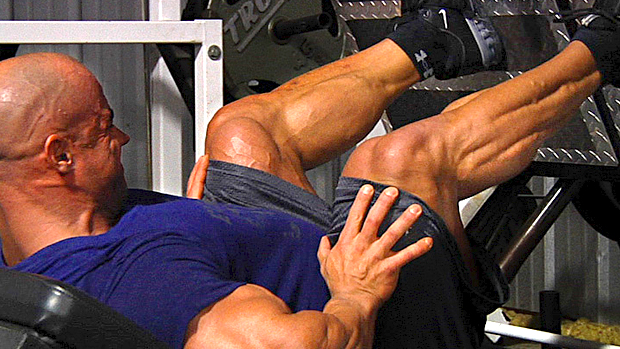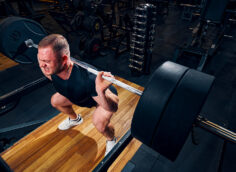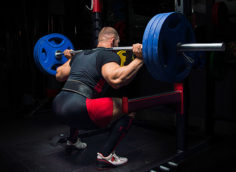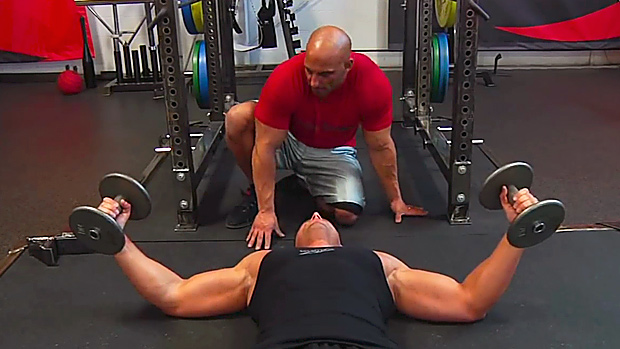Here's what you need to know...
- Don't discount the leg press just because it doesn't involve a barbell. Every variation can help grow massive legs.
- The escalating leg press is one giant set with micro-stops. The banded leg press makes the eccentric or negative phase more challenging.
- The drop sets method increases time under tension as you work down in weight. Three-second descents force you to lower the weight excruciatingly slow.
- VMO supersets attack and build the "teardrop" quad muscle just above the knee.
- Combine wide-stance leg presses with top-half leg extensions to nail the outer quads.
The leg press gets a bad rap among strength training purists because it's easier to perform than the squat. You don't need much in the way of mobility or athleticism to do it. You just load up the plates, hop on, and go.
But just because the leg press isn't as complex as the squat doesn't mean it's a bad exercise. In fact, for sheer leg size, the leg press may be in a class by itself since there are so many different ways to safely jack up the growth-producing intensity.
Here are six leg press variations for freaky size and strength:
This one is pure shock and awe for the entire lower body. The good news is it's only one set; the bad news is it's probably the longest, most painful set of your life.
You're going to do one extended set with a "micro-stop" every fourth rep. At each stop your training partners will add a 45-pound plate. If you're not strong enough for 45-pound increments, use 25-pound plates.
Be sure to only lock out every fourth rep, and only long enough to add the weights. The other reps should be short of lockout, using constant tension on the muscle with smooth turnarounds.
Perform as many 4-rep micro-stop sets as you can, which usually ends up equaling about 16 total reps.
It's key to begin this exercise with the right load. That should be about 60 percent of your 10 RM. So if you can safely leg press 400 pounds for 10 reps, start with 240 pounds as your base weight.
In the banded leg press, the eccentric (lowering) portion of the lift becomes much more difficult as the bands try to pull the platform down on top of you. The trick is to stay focused and fight the resistance.

Start by attaching one band on each side of the leg press. Do sets of 8 reps and don't lock these out – fire away like a piston, up and down nonstop. Control the weight as it goes down and ram up to three-fourths lockout and then right back down again.
Don't use bands every leg workout. They can beat up your joints if used too frequently.
Drop sets are one of the oldest intensity tricks in the weight-training book. They're also extremely taxing, which is why I like to perform just one gut-busting drop set.
Ramp up in sets of 4 to a weight that you can use for a drop set. Once there, do 8 reps, drop the weight significantly and do 8 more reps. Repeat the drops two more times for a total of 32 reps.
The key to size is maximizing time under tension or TUT. Three-second descents maximize this particular mechanical tension.
To do them, start by doing a couple of low-rep sets to get up to your working weight. Once you get there, do sets of 8 reps using 3-second descents.
Be sure to drive up hard out of the bottom – don't worry about the concentric tempo, just drive the weight up with force. Don't lock out either; stop just short.
Tip: Use the foot placement that allows you to be at your absolute strongest. This isn't the time to be honing in on your quad sweep. The goal here is to dig deep and push the most weight you can while maintaining the 3-second descent.
The VMO is also known as the teardrop, the much-coveted quad muscle located right above the kneecap.
To attack it with the leg press, assume a close stance and place your feet slightly lower on the platform. These should be done when your legs are pumped so do plenty of warm-up sets to load blood in there.
The goal is to develop a ton of metabolic stress, so all sets will be performed like a piston and for a high number of reps. Do a couple of 25-rep sets to get up to your working weight.
Drive up hard out of the bottom and get into a rhythm – just pump the weight up and down. Don't lock out. If you hit 25 reps, go up 25 or 45 pounds per side. Keep going until you just miss 25 reps. To make this even better, superset the leg presses with partial leg extensions.
The leg extension gets a bad rap among lifters and while it isn't a great mass building movement, it's very effective when supersetted with the leg press.
Ramp up with several warm-up sets to get your knees ready and then do the following rep scheme: 20, 15, 10, and 8 reps, going progressively heavier each set. Only work the bottom half of the movement and lean back in the seat!
This version of the leg press is more for quad sweep (vastus lateralis). Assume a wide stance and turn your toes out in a frog-style stance. Allow your knees to come down outside of your body, so you'll be sort of pushing your knees out as you lower the platform.
The concentric portion of the lift should be done explosively. Ideally your leg press will have stops that will allow you to perform rest-pause reps. Set the stops relatively high and let the weight rest for 1 second before blasting it back up explosively. You'll be surprised at how good this shortened range of motion feels.
Keep going up in weight until you can't get 20 reps and be sure to push yourself. If you reach 15 reps and need to rest a second before going for 20, that's okay. My last set sometimes involves 4 or 5 stops along the way to 20.
Do 20 reps on all sets. If you don't have stops, just blast the weight out of the bottom! Do not lock these out.
Now superset these with partial leg extensions using the top half of the movement. Flex hard at the top and only lower the weight half way before driving back up.
You'll need to lighten the weight considerably compared to what you were doing on the partials out of the bottom. These should burn like fire!
Don't avoid doing one exercise simply because another exercise is superior. There are very few either/or scenarios when training for hypertrophy.
A good muscle-building program will feature a variety of quality movements rotated out according to your needs. Your success depends more on your effort than on your exercise choices.





